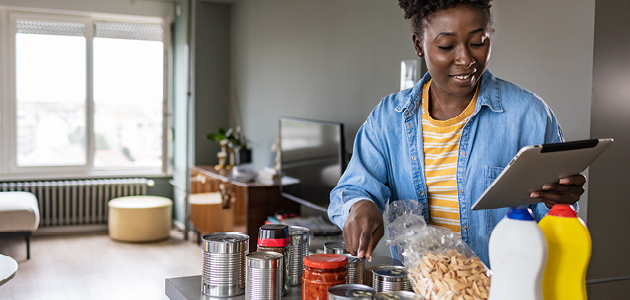“Canning” or preserving food is a centuries-old technique, but the kind of canned goods we see now in stores around the world revolutionized homemaking for women after WWII by making it easier to put meals on the table.1
Those time-saving tins have definitely struggled with their image in this century though. People often turn their noses up at them, believing they are full of chemicals and sodium – which in some cases they are.
But canned foods can play an important role in a healthy diet if you choose wisely, and they are an affordable option for budget-conscious shopping. Taking a quick glance at the labels on premade meals will show you whether these are a healthy option or not, pay attention to the salt, fat and sugar levels.
What canned foods are good for you?
Think of canned foods as raw ingredients, not as a meal, and you’re onto something!
Canned fruits and vegetables have been picked and processed at the peak of freshness, and the canning process preserves many nutrients, keeping them just as nutritious as fresh or frozen produce.2 That means they’re perfect additions to homemade soups, casseroles and stews or to eat as a side along with your meal.
Canned fish is a great source of protein and other nutrients, and according to the USDA, fresh and canned fish have comparable amounts of omega-3 fatty acids, which may help lower your risk for cardiovascular disease.3
Just remember that all cans are not created equal, so make wise choices!
Choose fruit that’s packed in water, 100% juice or its own juices, not syrup (which is just added sugar), and choose canned vegetables with no salt added or those labeled “low” or “reduced” salt. If you can’t find reduced salt options, draining and rinsing canned beans and vegetables can help wash away any extra sodium.
Some canned fish is also sold with lower salt and packed in water, which makes it a healthier choice.
Convenient and inexpensive meal ideas
Canned foods are shelf stable, which means you can take advantage of sales and stock up on your favourites to have on hand, but they’re often less expensive than fresh and frozen foods even when they’re not on sale. And since prep work like cleaning, chopping and cooking or blanching isn’t required, it makes using canned goods in your meals quick and easy.
Have a look through these recipe collections and see what you can make for your family!
- BBC GoodFood: 31 recipes including meatball black bean chili, tomato and chickpea curry and feelgood fish cakes.
- Taste of Home: 101 recipes including easy Moroccan chickpea stew, quick and easy vegetable potpie and lemony Greek beef and vegetables.
- Eating Richly: 50 canned food recipes to get you through tough times including ham and bean soup, minestrone and “hunger challenge” rice and beans.
- EatingWell: dietician-approved recipes including easy salmon cakes, vegetarian enchilada casserole and vegan lentil soup.
Donating canned goods
Food banks always need healthy food options, and canned goods fit the bill! If you’re stocking up, consider adding an extra can to your cart to donate if you can. Food banks regularly need:
- Canned fruit
- Canned vegetables
- Canned fish
- Canned beans
- Canned stews and soups
Foresters Financial members, if you want to help your local food bank or soup kitchen, remember that you can apply for Community Volunteer grants to help organise a food drive and make a difference to those in need.
Foresters Care is another way to help those struggling with food insecurity. With a Foresters Care grant, if you see a need in your community, you can seize the moment and help right away. Visit MyForesters for more information on how to apply.
SOURCES
1 https://www.womenshistory.org/articles/how-highly-processed-foods-liberated-1950s-housewives
2 https://www.eatright.org/food/planning/smart-shopping/are-canned-foods-nutritious-for-my-family
3 https://www.health.harvard.edu/newsletter_article/ask_the_doctor_is_canned_fish_good




